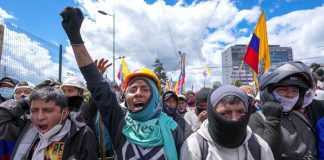SOUTH KOREA has been rocked by weeks of protests against the government’s decision to lift a ban on imports of US beef. They have been banned since the detection of mad cow disease among US beef stocks in 2003.
Up to a million people across the country joined huge candlelight vigils—including 700,000 in the capital, Seoul. Police were forced to set up barricades out of shipping containers to prevent demonstrators marching to the presidential palace. When protesters tried to dismantle the barricades, riot police attacked the crowds.
The protests have developed into a general movement against the right-wing policies of president Lee Myung-bak. Despite being in office for just four months, the president’s popularity rating sank to 16 per cent in June.
The new government’s policies of handing key cabinet and staff posts to rich real estate speculators, its determination to press ahead with privatisation and now its efforts to ban demonstrations have sent it into crisis.
On the 21st anniversary of protests that brought down the military dictatorship, South Korea is again witnessing a mass movement for democracy and wider social change.
By James Supple





